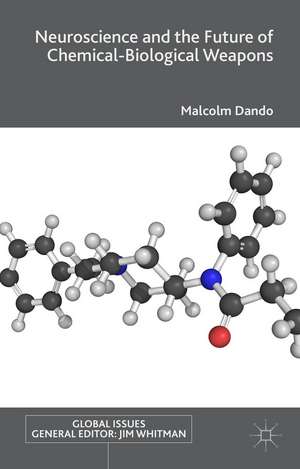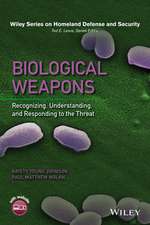Neuroscience and the Future of Chemical-Biological Weapons: Global Issues
Autor Malcolm Dandoen Limba Engleză Hardback – 16 iul 2015
Din seria Global Issues
-
 Preț: 136.44 lei
Preț: 136.44 lei - 8%
 Preț: 158.20 lei
Preț: 158.20 lei - 9%
 Preț: 157.57 lei
Preț: 157.57 lei - 14%
 Preț: 143.78 lei
Preț: 143.78 lei - 14%
 Preț: 234.44 lei
Preț: 234.44 lei - 13%
 Preț: 235.44 lei
Preț: 235.44 lei - 15%
 Preț: 642.83 lei
Preț: 642.83 lei - 14%
 Preț: 234.17 lei
Preț: 234.17 lei - 14%
 Preț: 144.29 lei
Preț: 144.29 lei -
 Preț: 175.88 lei
Preț: 175.88 lei - 15%
 Preț: 647.92 lei
Preț: 647.92 lei - 15%
 Preț: 643.34 lei
Preț: 643.34 lei -
 Preț: 386.99 lei
Preț: 386.99 lei - 14%
 Preț: 111.38 lei
Preț: 111.38 lei - 15%
 Preț: 642.51 lei
Preț: 642.51 lei - 14%
 Preț: 145.90 lei
Preț: 145.90 lei -
 Preț: 392.21 lei
Preț: 392.21 lei - 15%
 Preț: 643.84 lei
Preț: 643.84 lei -
 Preț: 314.92 lei
Preț: 314.92 lei - 13%
 Preț: 235.18 lei
Preț: 235.18 lei - 15%
 Preț: 155.89 lei
Preț: 155.89 lei - 15%
 Preț: 640.71 lei
Preț: 640.71 lei -
 Preț: 355.62 lei
Preț: 355.62 lei - 15%
 Preț: 643.34 lei
Preț: 643.34 lei - 18%
 Preț: 782.44 lei
Preț: 782.44 lei -
 Preț: 354.77 lei
Preț: 354.77 lei -
 Preț: 383.71 lei
Preț: 383.71 lei - 9%
 Preț: 157.04 lei
Preț: 157.04 lei - 18%
 Preț: 1015.82 lei
Preț: 1015.82 lei - 15%
 Preț: 639.41 lei
Preț: 639.41 lei - 14%
 Preț: 124.37 lei
Preț: 124.37 lei - 13%
 Preț: 235.63 lei
Preț: 235.63 lei -
 Preț: 391.22 lei
Preț: 391.22 lei - 15%
 Preț: 644.18 lei
Preț: 644.18 lei - 13%
 Preț: 234.53 lei
Preț: 234.53 lei - 14%
 Preț: 158.64 lei
Preț: 158.64 lei - 15%
 Preț: 641.85 lei
Preț: 641.85 lei -
 Preț: 391.22 lei
Preț: 391.22 lei -
 Preț: 392.75 lei
Preț: 392.75 lei - 14%
 Preț: 144.39 lei
Preț: 144.39 lei - 15%
 Preț: 644.49 lei
Preț: 644.49 lei -
 Preț: 383.93 lei
Preț: 383.93 lei -
 Preț: 358.16 lei
Preț: 358.16 lei - 15%
 Preț: 142.89 lei
Preț: 142.89 lei - 15%
 Preț: 639.25 lei
Preț: 639.25 lei
Preț: 386.99 lei
Nou
Puncte Express: 580
Preț estimativ în valută:
74.05€ • 77.67$ • 61.65£
74.05€ • 77.67$ • 61.65£
Carte tipărită la comandă
Livrare economică 01-15 aprilie
Preluare comenzi: 021 569.72.76
Specificații
ISBN-13: 9781137381811
ISBN-10: 1137381817
Pagini: 191
Ilustrații: XIV, 191 p.
Dimensiuni: 140 x 216 x 13 mm
Greutate: 0.39 kg
Ediția:1st ed. 2015
Editura: Palgrave Macmillan UK
Colecția Palgrave Macmillan
Seria Global Issues
Locul publicării:London, United Kingdom
ISBN-10: 1137381817
Pagini: 191
Ilustrații: XIV, 191 p.
Dimensiuni: 140 x 216 x 13 mm
Greutate: 0.39 kg
Ediția:1st ed. 2015
Editura: Palgrave Macmillan UK
Colecția Palgrave Macmillan
Seria Global Issues
Locul publicării:London, United Kingdom
Cuprins
PART I: THE PAST
1. Neuroscience and the Developments of CBW
2. The Structure and Function of the Brain
3. The CBW Non-Proliferation Regime
4. The Dual-Use Challenge
PART II: THE PRESENT
5. Modern Civil Neuroscience
6. Novel Neuroweapons
7. Implications of Advances in Neuroscience
8. The Search for Incapacitants
9. Bioregulators and Toxins
PART III: THE FUTURE
10. The BTWC and CWC Facing Scientific Change
11. Where are We Going?
12. The Governance of Dual-Use Neuroscience
1. Neuroscience and the Developments of CBW
2. The Structure and Function of the Brain
3. The CBW Non-Proliferation Regime
4. The Dual-Use Challenge
PART II: THE PRESENT
5. Modern Civil Neuroscience
6. Novel Neuroweapons
7. Implications of Advances in Neuroscience
8. The Search for Incapacitants
9. Bioregulators and Toxins
PART III: THE FUTURE
10. The BTWC and CWC Facing Scientific Change
11. Where are We Going?
12. The Governance of Dual-Use Neuroscience
Recenzii
''The justified excitement about modern brain science should also come with a warning label. That's what Malcolm Dando has given us in this timely, powerful and deeply informed book.'' Jonathan D. Moreno, University of Pennsylvania, USA
''Chemical and biological weapons and their intersection require an understanding of the science and the international policy banning them. Non-scientists will value his clear explanation of brain science. Neuroscientists will understand why their work merits scrutiny for weapons implications. All of us will benefit by Dando's singular contribution to why we should be worried and why we must act now.'' Marie Isabelle Chevrier, Rutgers University-Camden, USA
''Chemical and biological weapons and their intersection require an understanding of the science and the international policy banning them. Non-scientists will value his clear explanation of brain science. Neuroscientists will understand why their work merits scrutiny for weapons implications. All of us will benefit by Dando's singular contribution to why we should be worried and why we must act now.'' Marie Isabelle Chevrier, Rutgers University-Camden, USA
Notă biografică
Professor Dando studied Zoology at St Andrews University and, after post-doctoral research in the United States, held fellowships in Operational Research at the University of Sussex that were funded by the Ministry of Defence. At the University of Bradford he has worked on disarmament and arms control issues, particularly in regard to biological and chemical weapons, since 1993. He is a Fellow of the UK Society of Biology.








